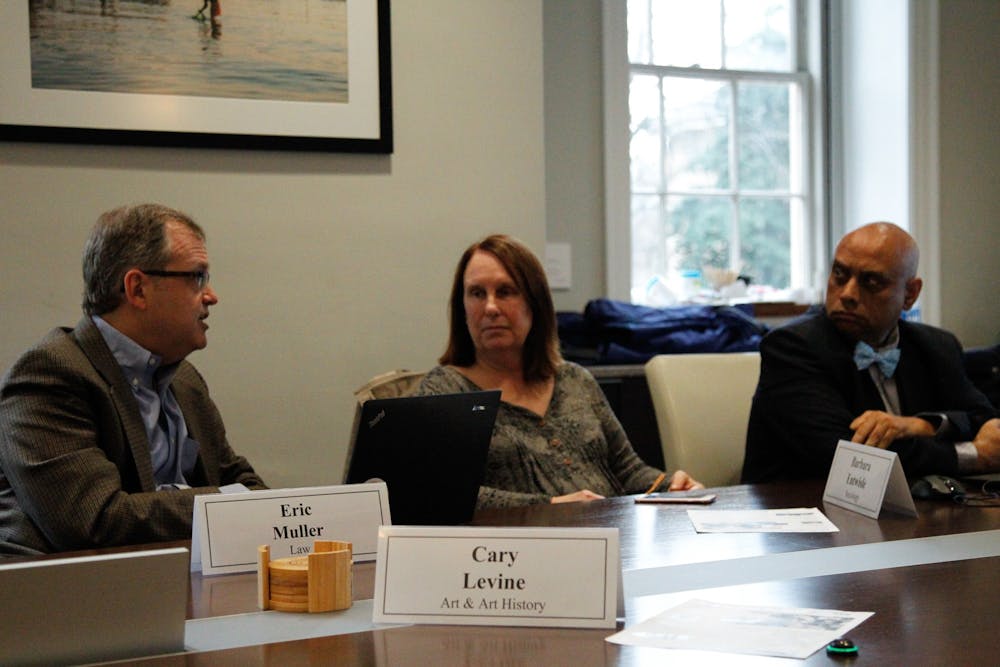The next FEC meeting will be held via Zoom on Monday, Oct. 19 from 3 to 5 p.m.
But, what does the Committee do?
The Committee’s main purpose is to serve as an advisory committee to Chapman, chairperson of the faculty. FEC members are able to voice their perspectives about University issues, including student concerns.
“We’re often looking at issues really that affect the whole campus, as this is the executive committee of faculty governance, so it has a particular focus on how the faculty sees the world,” Chapman said.
Deb Aikat, an associate professor at the Hussman School of Journalism and Media, is a member of the FEC for the 2020-2021 term. He said he sees the FEC as being an important advisory board to the administration on University matters.
The FEC also acts as a part of the Faculty Council, a larger legislative body that includes the chancellor and delegates to the Faculty Assembly.
The Faculty Council applies the legislative powers of the General Faculty, which include defining the educational policies of the University. The Council can also determine requirements for admissions and study programs, recommend candidates for recognitions or awards and advise the chancellor and other administrators on issues of student conduct or discipline.
Although the FEC can influence decisions ultimately made by the administration, Chapman said it may lack the power to enforce decisions — unless it is acting on behalf of the Faculty Council.
“We are just an advisory group working with UNC leadership." Aikat said. "As an executive committee we give them advice, we question things as things happen. I don’t think we have a lot of power. You share your concerns, and some of it will be accepted, and some of it will not.”
Even so, Chapman indicated that the FEC took on an unprecedented role in the University community this past spring and summer, when concerns about COVID-19 and student and staff safety surfaced.
“Over the spring and summer we had meetings that huge numbers of people were attending who were not on the committee, by Zoom, so we were using them almost as town halls to get information,” Chapman said.
This new role was in part because the Faculty Council doesn’t meet over the summer. Instead, through weekly meetings, the FEC was able to act on behalf of the Faculty Council to advise the administration.
To get the day's news and headlines in your inbox each morning, sign up for our email newsletters.
Since this summer, Aikat said that the FEC has focused broadly on communication with the administration in regard to COVID-19 and the distribution of information from Chancellor Kevin Guskiewicz. Policies such as keeping students off campus, access to testing and modifying campus based on the virus have been key points of discussion.
Why should students care?
Aikat said his role as a member of the committee, in his mind, extends beyond issues pertaining solely to the faculty or administration.
“Students should care about it because we care about students, simple as that,” Aikat said. “We are a very significant voice on campus because we are 14 members, and some of our colleagues think of us as troublemakers, but we are not, we are just the voice of the faculty.
"We are protecting our students and student issues, and lastly we make sure the University is taking care of other stakeholders, such as its employees.”
While the FEC plays an important role in University matters including student affairs, some students, like sophomore Sarah Montross, aren’t aware of the committee’s influence.
“I wish it was more accessible and that the student community knew more information about it,” Montross said. “I think that it would be important to students to know that there is an avenue to take that is pretty accessible and a pretty important avenue to make their voices heard.”
Many of the issues the FEC discusses in its meetings are pertinent to student life and student action. Since their meetings are open to all, the FEC often hears firsthand about certain student concerns.
“I think that the FEC is something that affects our time as students here, and those who come after us,” Montross said. “If students can get involved it has the potential to make positive change.”
university@dailytarheel.com



